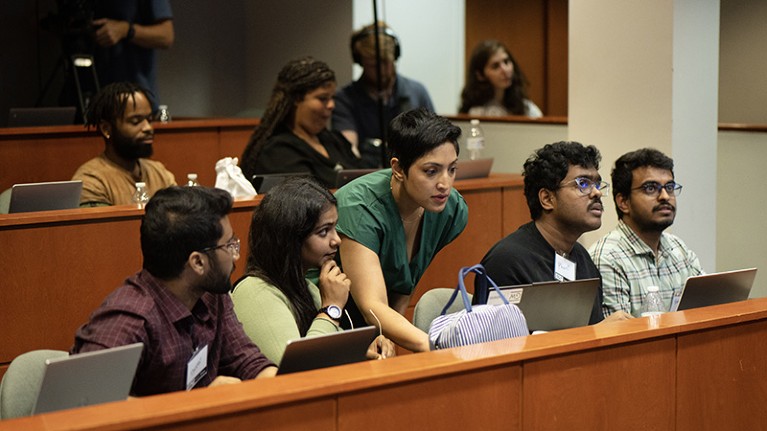[ad_1]

Information scientist Rumman Chowdhury (centre) advises college students tasked with breaking artificial-intelligence chatbots throughout a contest in July.Credit score: Marvin Joseph/The Washington Publish by way of Getty
The broadly hyped and controversial giant language fashions (LLMs) — higher generally known as synthetic intelligence (AI) chatbots — have gotten indispensable aids for coding, writing, educating and extra. Their rising recognition has been matched by a rise in user-friendly choices which are accessible by Web browsers. By our depend, there are a minimum of eight main choices, and much more area of interest ones; you may need even tried just a few. However you in all probability haven’t had time to systematically check your prompts on a number of bots directly, so that you may not be getting probably the most out of them.
To raised match instruments with purposes, we examined eight fashionable browser-based LLMs in formal and informal writing, textual content and tone enhancing, and programming duties. These LLMs have been educated on totally different information and have totally different ‘personalities’ and approaches to answering questions. We spent a surprising period of time and power managing the frustration that comes with poorly written textual content and complicated AI-generated code in our seek for the very best collaborator. In the long run, you’ll have to steadiness their strengths and weaknesses to seek out the proper match.
NatureTech
Right here we offer a fast abstract of our (non-quantitative, non-scientific) impressions of every chatbot’s behaviour (see ‘Which chatbot is best for you?’).
Bard, the ‘playful one’
Google’s Bard AI is enjoyable to make use of. In our expertise, it gives probably the most human-like responses, in all probability as a result of its coaching information contained much less formal communication, together with posts on social media and on-line dialogue boards. As an example, we requested Bard what its zodiac signal may be if it have been human. It stated that, on the premise of when it went reside, it might be a Virgo. It additionally responded with “I don’t know” as an alternative of a improper reply extra often than did different chatbots. Nevertheless, it struggled when requested particular programming questions. Bard is a good device for altering the tone of your writing to be extra approachable to put audiences and for writing and refining e-mails, or if you wish to work together with a bot that has a pure model of talking.
Claude, the ‘witty one’
Claude, developed by the start-up firm Anthropic in San Francisco, California, has a conversational model however feels extra formal than Bard. It additionally has the very best grasp of wordplay. In our testing, Claude (which is offered in two varieties: Claude-instant and Claude 2) was the one LLM that would reliably recommend titles or acronyms that made sense, and now we have used it to call a number of tasks. We additionally favored the way it advises on altering the tone and ritual of a writing pattern for various audiences. Claude is especially good at summarizing written textual content and carried out properly at writing code.
ChatGPT, the ‘fashionable one’
Most individuals who’ve dabbled with LLMs have in all probability tried ChatGPT-3.5 or the up to date model, ChatGPT-4 — made by OpenAI in San Francisco. Another choice is Sage, from ThoughtSpot in Mountain View, California; it was constructed utilizing the GPT structure however was educated on totally different information. All three carried out equally. These bots have probably the most easy communication model of these we examined. ChatGPT will all the time give a solution, however generally the reply is inaccurate. It additionally generally invents references1. And it doesn’t all the time change its solutions considerably when corrected by the person.

Carrie Wright, Candace Savonen, Ava Hoffman and Elizabeth Humphries (left to proper) have investigated how giant language fashions could be utilized to science.Credit score: Carrie Wright and Clifton McKee
ChatGPT-3.5 and ChatGPT-4 can supply further context of their solutions with out being requested to take action, and are nice locations to start out when planning a venture or doc. With regards to enhancing your writing, ChatGPT-4 performs higher as a result of it doesn’t easy away the underlying message as ChatGPT-3.5 sometimes does.
Phind, the ‘technical one’
Phind is totally different from its opponents: it was designed to reply software-development questions and excels at that activity. We particularly favored the way it consists of hyperlinks to posts on on-line boards and blogs that cowl the identical kind of programming concern as that in your question. Phind additionally works properly as a normal search engine. Nevertheless, in the case of writing textual content, it generally copies straight from its supply materials, so look ahead to plagiarism. However do maintain Phind in thoughts when you’ve got particular programming questions, or if you would like Wikipedia-like info.
Llama, the ‘new one’
Llama, from Meta in Menlo Park, California, has turn into obtainable to most of the people solely up to now few months. To date, we haven’t discovered it to be all that totally different from its opponents. It should reply hypothetical questions as Bard does, and appears to supply code that works with minimal debugging.
Attending to know you
The persona variations between the LLMs are properly illustrated by the solutions that every bot gave to a well-liked get-to-know-you query: what fictional character do you determine with probably the most? Bard engaged the way in which we anticipated it to: its reply was the android Information from Star Trek: The Subsequent Era, as a result of Information is an AI that’s clever, curious, all the time studying and making an attempt to grasp what it means to be human.
Claude and ChatGPT interpreted the query actually and answered that, as AI language fashions, they don’t have feelings or experiences and can’t determine with fictional characters. Claude added that, though it has no impartial sense of self, different LLMs may need been programmed with personalities that have been modelled after these of sure characters. ChatGPT adopted its denial with a proposal to supply details about particular fictional characters.
Equally, Phind stated that it was an AI bot and didn’t determine with a fictional character, however its reply included a listing of fashionable fictional characters with whom individuals usually determine, in addition to hyperlinks to lists such because the ‘High 120 Iconic Fictional Characters’. We encountered related outcomes when asking the bots for his or her Hogwarts homes from the Harry Potter sequence, zodiac indicators and persona sorts from fashionable exams, comparable to Myers–Briggs.
Llama answered that it was an AI bot however did supply a number of characters with which it’d share traits. Nevertheless, once we modified the query to, “In case you have been human, what fictional character would you most determine with?” Llama replied Sherlock Holmes, as a result of he’s extremely analytical and element oriented.
Whichever LLM you select, if you wish to maintain your long-term relationship practical and pleased, think about the following pointers.
First, persistence and refinement are key. Your queries have to be clear concerning the output you need and supply sufficient context for the LLM to work with. Anticipate some back-and-forth. It would take extra time to speak properly to the LLM than it might to do the duty your self, so consider carefully about the place you need to spend your effort.
Second, check every part. All LLMs are fallible, so double-checking what they inform you is a should, whether or not that includes testing instructed code, verifying citations or ensuring the fundamental information are proper. Most LLMs have been educated on information which are biased in a roundabout way, so their solutions could be biased as properly. And chatbots can and do change over time — as an example, Bard’s builders say that the chatbot would be the first LLM to confess how assured it’s in its response.
Lastly, the significance of human decision-making when utilizing AI can’t be underestimated: LLMs may be poised to vary how we work, however they nonetheless are solely pretty much as good because the people in entrance of the keyboard.
Competing Pursuits
J.T.L. teaches Coursera programs that cowl subjects in AI, which generate income; is a co-founder of an organization, Synthesize Bio, that makes use of AI however doesn’t develop LLMs; and is a co-foudner of a Papr, an organization that’s growing an app for speedy peer evaluation.
[ad_2]



